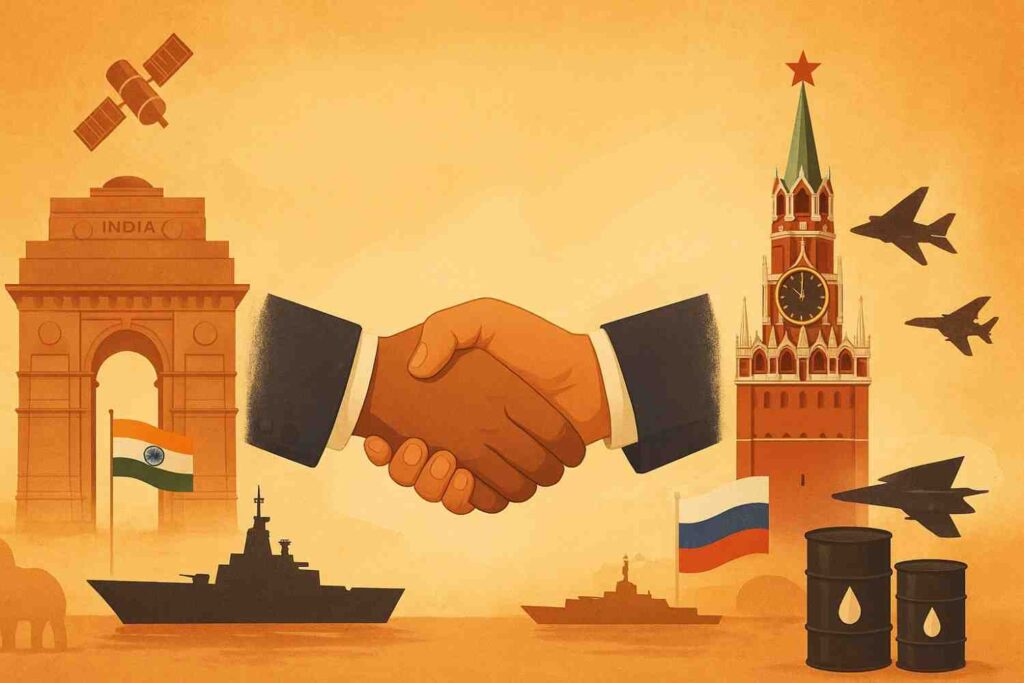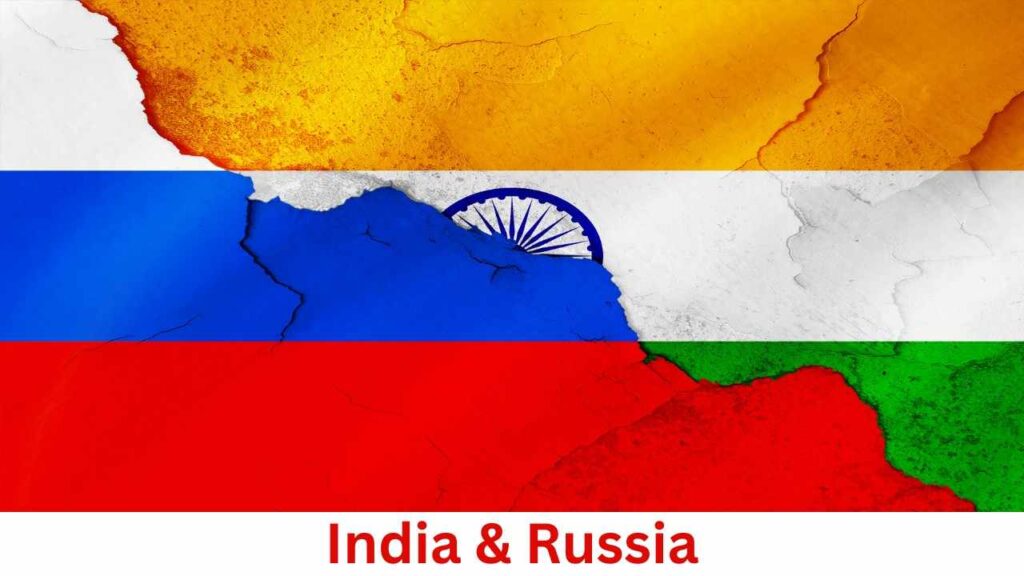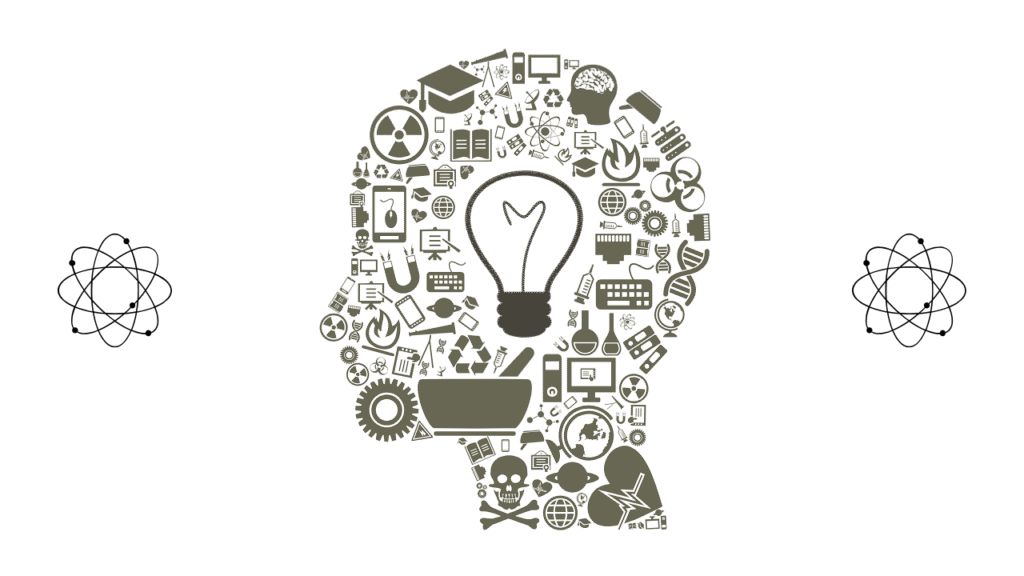
Explore why India–Russia diplomatic ties have remained strong for over seven decades. From defense partnerships to energy cooperation, discover the history, mutual trust, and shared interests shaping this enduring relationship.
Introduction: A Bond Forged in Trust
The relationship between India and Russia is often described as an “all-weather friendship.” Unlike many global partnerships that fluctuate with political changes or economic tides, this bond has stayed consistent for decades.
From the Cold War era to today’s multipolar world, the two nations have shared strategic trust, mutual respect, and deep cooperation across defence, energy, space, and trade.
But what makes this friendship so resilient, even in a rapidly changing global order? Let’s explore.
Historical Roots: The Foundation of Trust
The India–Russia relationship traces its origins back to the 1950s when India, newly independent, was navigating Cold War tensions.
While India maintained a Non-Aligned Movement policy, the Soviet Union emerged as a dependable partner by:
- Supporting India’s industrialisation (helping set up steel plants in Bhilai, Bokaro, and Vizag).
- Vetoing UN resolutions unfavourable to India, such as during the 1971 Bangladesh Liberation War.
- Assisting in defence technology and training.
Key takeaway: The Soviet Union’s consistent support in crucial moments created a sense of trust that forms the bedrock of the current India–Russia relationship.

Defence: The Backbone of the Partnership
Defence ties remain the strongest pillar of this relationship. As per the latest SIPRI data (2024), nearly 60–65% of India’s military hardware still comes from Russia.
Major Defence Collaborations
- BrahMos Missile – A joint India–Russia venture, one of the fastest cruise missiles in the world.
- S-400 Air Defence Systems – Key for India’s strategic security against aerial threats.
- Nuclear Submarines – Lease agreements for advanced Russian submarines have boosted India’s naval capabilities.
Why Russia Remains India’s Key Defence Partner
- Technology Transfer – Russia shares technology more openly than many Western suppliers.
- Customisation – Russian defence equipment is often modified to suit Indian operational needs.
- Long-Term Maintenance – Existing systems are already Russian-origin, making upgrades and spare parts easier to secure.
Energy Cooperation: Fueling the Friendship
Energy is another pillar of India–Russia relations. Russia is among the world’s top producers of oil and natural gas, while India is one of the largest consumers.
Oil and Gas
- India has increased imports of discounted Russian crude since 2022, helping control domestic fuel inflation.
- Indian companies like ONGC Videsh have stakes in Russian oil fields (e.g., Sakhalin-1).
Nuclear Energy
- Russia is building nuclear reactors in India, notably the Kudankulam Nuclear Power Plant in Tamil Nadu.
- This collaboration supports India’s goal of expanding clean energy capacity.

Space and Science Collaboration
The partnership extends beyond Earth.
- Russia helped launch India’s first astronaut, Rakesh Sharma, in 1984.
- Today, Russia is assisting India’s Gaganyaan mission by training astronauts and providing life-support technology.
This space cooperation demonstrates mutual trust in sharing advanced and sensitive technologies.
Trade and Economic Links
While trade volumes have historically been modest compared to India’s trade with the US, China, or the EU, they have been growing rapidly.
- In 2024, bilateral trade crossed $65 billion, largely driven by energy imports.
- Key exports from India: Pharmaceuticals, tea, coffee, electronics.
- Key imports from Russia: Crude oil, coal, fertilisers, defence equipment.
Political Support on Global Platforms
India and Russia often support each other in multilateral forums like the UN, BRICS, SCO, and G20.
Examples:
- Russia supports India’s bid for a permanent UN Security Council seat.
- India has backed Russia’s role in Eurasian security frameworks.
Why the Relationship Has Stayed Strong
1. Mutual Strategic Interests
Both nations benefit from a multipolar world order where neither is dependent on a single global power.
2. Consistency Through Political Changes
Leaders from both sides, regardless of political party or ideology, have maintained strong ties.
3. Complementary Needs
India needs defence technology and energy; Russia needs markets and reliable partners.
4. Trust Built Over Decades
Past support during crises has created a foundation that newer partners cannot easily replace.
India–Russia Ties in the Current Geopolitical Climate
With shifting global alliances, India has also deepened ties with the US, Japan, and Europe. However, Russia remains a trusted partner, especially in defence and energy.
India’s challenge is balancing Western partnerships without diluting Russian ties, particularly in light of sanctions on Moscow.
Challenges Ahead
While the relationship is strong, there are hurdles:
- Western Sanctions on Russia – May impact trade and defence procurement.
- China Factor – Russia’s growing closeness with China could complicate India’s strategic calculations.
- Diversification of Defence Suppliers – India is sourcing more from the US, France, and Israel.
Indian Public Perception
In India, Russia is often viewed positively. Older generations remember Soviet support in 1971, while younger Indians see Russia as a reliable defence supplier and energy partner.
The Road Ahead
The future of India–Russia ties will likely:
- Continue strong defence cooperation.
- Expand in energy security (oil, gas, nuclear).
- See more technology partnerships in space and AI.
- Require careful diplomacy to manage differences over China and global sanctions.
Conclusion
The India–Russia relationship is more than just a diplomatic partnership — it’s a bond shaped by decades of trust, shared challenges, and mutual benefit.
While the geopolitical environment is evolving, the fundamental strengths of this relationship remain intact.
As the world shifts toward multipolarity, this friendship is set to adapt and endure, ensuring both nations remain key strategic partners for years to come.
Disclaimer: This article is based on publicly available information and reflects personal analysis. It is not affiliated with any government, political party, or organization mentioned.
Some Useful Links – Rare Earth Metals – Tug Of War






Leave a Reply